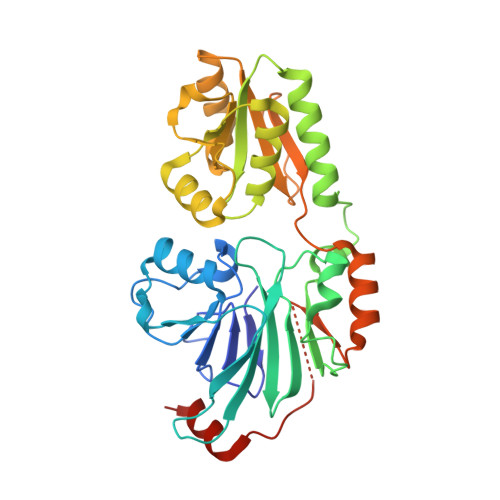A phosphate binding pocket is a key determinant of exo- versus endo-nucleolytic activity in the SNM1 nuclease family.
Baddock, H.T., Newman, J.A., Yosaatmadja, Y., Bielinski, M., Schofield, C.J., Gileadi, O., McHugh, P.J.(2021) Nucleic Acids Res 49: 9294-9309
- PubMed: 34387694
- DOI: https://doi.org/10.1093/nar/gkab692
- Primary Citation of Related Structures:
7A1F, 7B2X, 7B9B - PubMed Abstract:
The SNM1 nucleases which help maintain genome integrity are members of the metallo-β-lactamase (MBL) structural superfamily. Their conserved MBL-β-CASP-fold SNM1 core provides a molecular scaffold forming an active site which coordinates the metal ions required for catalysis. The features that determine SNM1 endo- versus exonuclease activity, and which control substrate selectivity and binding are poorly understood. We describe a structure of SNM1B/Apollo with two nucleotides bound to its active site, resembling the product state of its exonuclease reaction. The structure enables definition of key SNM1B residues that form contacts with DNA and identifies a 5' phosphate binding pocket, which we demonstrate is important in catalysis and which has a key role in determining endo- versus exonucleolytic activity across the SNM1 family. We probed the capacity of SNM1B to digest past sites of common endogenous DNA lesions and find that base modifications planar to the nucleobase can be accommodated due to the open architecture of the active site, but lesions axial to the plane of the nucleobase are not well tolerated due to constriction around the altered base. We propose that SNM1B/Apollo might employ its activity to help remove common oxidative lesions from telomeres.
Organizational Affiliation:
Department of Oncology, MRC Weatherall Institute of Molecular Medicine, University of Oxford, OX3 9DS, UK.

















